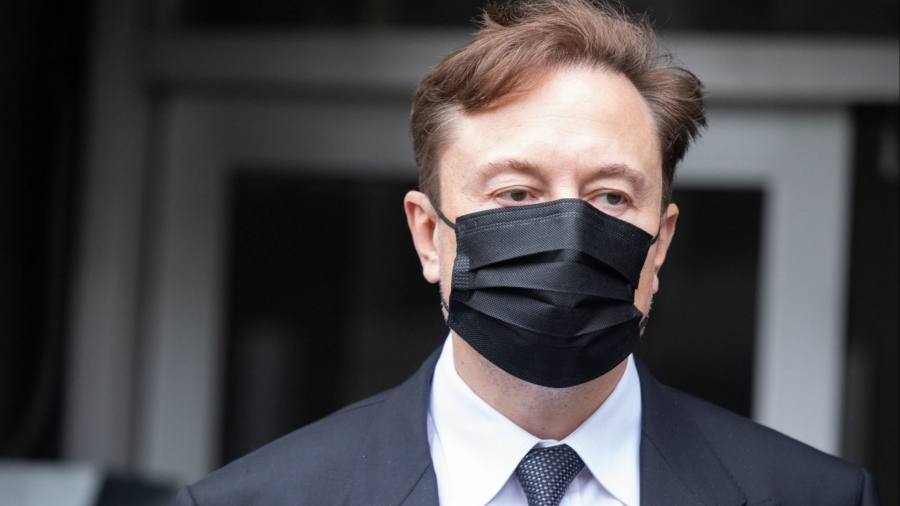Elon Musk wins investor lawsuit over Tesla ‘funding secured’ tweet

Elon Musk has defeated a shareholder lawsuit alleging that tweets claiming he had the “funding secured” to take Tesla private cost investors billions of dollars in losses.
The verdict was delivered on Friday in San Francisco federal court after a three-week trial, in a victory for the billionaire chief executive of the electric-vehicle maker.
The nine-person jury took just under two hours to reach its unanimous decision, vindicating Musk’s decision to take the case to trial rather than settle.
“Thank goodness, the wisdom of the people has prevailed!” Musk wrote on Twitter after the verdict. “I am deeply appreciative of the jury’s unanimous finding of innocence in the Tesla 420 take-private case.”
Outside the courtroom, Musk’s lawyer Alex Spiro said: “The jury got it right.”
Representing “thousands” of Tesla investors in the class action suit, lead attorney Nicholas Porritt had framed the case as an important test of rules and regulations for financial markets and society more broadly, during closing arguments earlier on Friday.
“Rules that apply to everyone else should apply to Elon Musk,” Porritt said. “Elon Musk published tweets that were false, with reckless disregard to the truth, and those tweets caused investors harm. Lots of harm.”
He concluded: “All of corporate America is watching.”
Following the verdict, Porritt told reporters: “Securities fraud cases are tough, hard to prove . . . This is the not kind of conduct we expect from the CEO of a public company.”
Speaking with plaintiffs’ attorneys after the verdict, as is permitted in the US court system, one juror said the case had been “disorganised” and that the affected investors who testified during the trial had “not been effective”.
Another said the case had been “hard to sometimes understand in layman’s terms. I don’t understand stocks. I don’t invest in options.”
The case centred on Musk’s August 7 2018 tweet declaring he was considering taking Tesla private at $420 a share and had funding secured to do so. It sent the shares into a spin, with Nasdaq temporarily halting trading in the electric vehicle company due to volatility.
During the trial, and again during the plaintiff’s closing argument on Friday, jurors were shown a chart detailing the leap in Tesla’s share price in the immediate aftermath of the contentious tweets. The stock jumped to $379.57 on the day of Musk’s tweet, and subsequently fell to $305.50 when it became clear the go-private move would not happen.
While Musk had held discussions with Saudi Arabian investors to take the company private, no deal ever materialised. But Spiro said Musk had not misrepresented having funding, and that raising the money needed was “not an issue”, since Musk’s shares in his company SpaceX could have been used to cover any shortfall if needed.
Although Musk was serious about taking Tesla private, and could have tapped enough funding to do so, the company did not go private because “shareholders wanted to stay public”, Spiro told the jury.
“That was his motive — to do what was right for the shareholders,” Spiro continued.
“Ultimately, whatever you think of him, this isn’t the ‘bad tweeter’ trial,” he added. “This is the ‘did this man commit fraud’ trial.”
Earlier in the trial Spiro said the “funding secured” tweets were a “split-second decision” from Musk in response to an article the Financial Times was preparing to publish about Saudi Arabia’s Public Investment Fund building a $2bn stake in Tesla. Musk said he was concerned news of the go-private talks would leak.
At issue was whether the actions caused material harm by misrepresenting the company’s position in a manner that might prompt a “reasonable investor” to buy or sell Tesla stock. “When Elon tweets about Tesla, people listen,” Porritt said.
Jurors heard earlier in the trial from Glen Littleton, the lead plaintiff, that he interpreted the tweet to mean Tesla’s going private was “completely definite in my mind”.
Another investor, Tim Fries, bought Tesla stock at $380 believing the company would go private at $420, as Musk had suggested in his tweet. “I lost money,” Fries told the jury, saying Musk’s tweet “gave me the confidence” that his investment was a sound one.
It is the second time Musk has been found not liable in civil litigation over posts on Twitter, the social media platform he now owns. In 2019 a Los Angeles jury cleared him of a defamation claim over a tweet in which he called a British diver a “pedo guy”.
However, the “funding secured” tweet has proven costly in other ways. He and Tesla each paid $20mn to settle legal action from the Securities and Exchange Commission. Musk also had to resign as the carmaker’s chair, although he kept his position as chief executive.
Share this news on your Fb,Twitter and Whatsapp
Times News Express:Latest News Headlines
Times News Express||Health||New York||USA News||Technology||World News